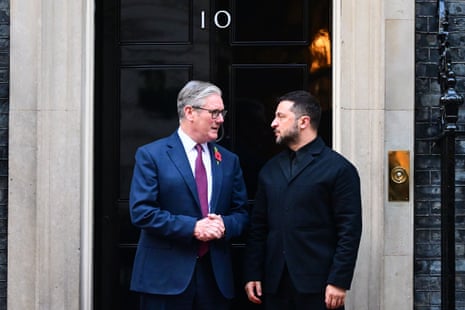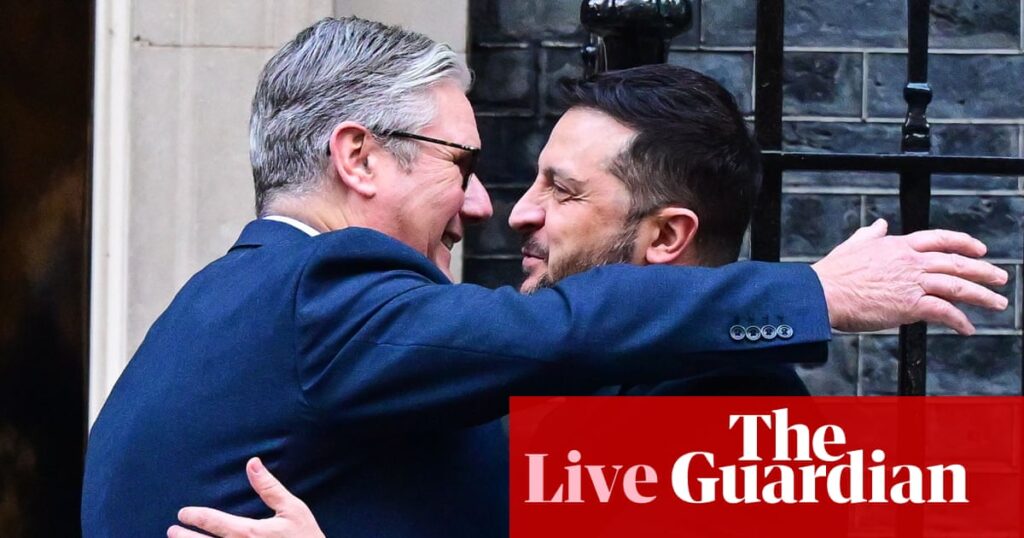Zelenskyy arrives at Downing Street
Ukrainian president Volodymyr Zelenskyy has arrived at Downing Street on Friday to meet prime minister Keir Starmer, and join other European leaders on a “coalition of the willing” call to discuss boosting Ukraine’s defences.

Key events
Russian special envoy in US for meetings with Trump administration
Russian president Vladimir Putin’s special envoy Kirill Dmitriev was in the US for meetings with Trump administration officials including special envoy Steve Witkoff, according to media reports on Friday.
Dmitriev was expected to meet Trump administration officials “to continue discussions about the US-Russia relationship,” CNN reported, citing sources with knowledge of the visit. Axios reported that Dmitriev would meet Witkoff in Miami on Saturday.
Donald Trump hit Russia’s two biggest oil companies with sanctions this week to press the Kremlin leader to end the war in Ukraine. Trump spoke to Putin last week and said he planned to meet Putin soon, but US officials have said the meeting is on hold.
Volodymyr Zelenskyy thanked the UK for its support and said Vladimir Putin was pushing Ukraine towards “humanitarian disaster”.
At the top of a bilateral meeting with UK prime minister Keir Starmer, the Ukrainian president said:
Yes, I agree with you and know that Putin doesn’t show that he wants to stop the war.
He said Russian aggression was “pushing us with such humanitarian disaster” with attacks targeting infrastructure including Ukraine’s energy sector.
“We’re thankful to you that we are not alone in this situation – from the very beginning of war but especially now, it’s very important,” Zelenskyy said.
Keir Starmer said “huge steps forward” had been taken this week to support Ukraine but there was “further we can do” on long-range capability as he described the UK as Kyiv’s “closest supporter and ally.”
At the start of a bilateral meeting with the country’s president Volodymyr Zelenskyy, the British prime minister said:
Volodymyr, it’s really good to be able to welcome you here in Downing Street again for a really important meeting between the two of us, bilaterally, but also for the coalition of the willing.
He added:
Through seeing his majesty, through our meeting and through the coalition of the willing, we reaffirm again our support for you and Ukraine and our absolute commitment to meeting the challenge of Russian aggression.
And whilst you have signalled the path for a way forward and shown that willingness of courage and determination, what we see from Putin is an absolute unwillingness to engage, in fact, the opposite, which is the continued attacks increasingly on civilians and on children and sadly I have to offer you my condolences again, as I did the last time we met and the time before, for those terrible losses.
I do think that this week we can really bear down on Russian oil and gas. Huge steps forward this week already. I think there’s further we can do on capability, particularly… long-range capability, and of course, the vital work for coalition of the willing when it comes to the security guarantees that are necessary.
So we’ve got really important business to go through with the coalition of the willing today, but it’s very good to be able to welcome you back.
French government faces threat of censure over wealth tax
A swing group in French parliament on Friday said that if a 2026 budget bill was not changed to include a tax on the supremely wealthy, it would vote down the government.
Prime minister Sebastien Lecornu has promised to get an austerity budget through a divided parliament by the end of the year, after the legislature toppled his two predecessors over cost-cutting measures. Earlier this month, he agreed to suspend an unpopular pensions reform so the Socialists could help him survive a confidence vote in parliament.
Lecornu has also pledged not to use a constitutional power to ram the budget bill into law without a vote as has been done in previous years.
But the Socialists, a swing group in the hung National Assembly, have also demanded a tax on the ultra-rich, which Lecornu has refused and not included in the draft budget.
A parliamentary commission earlier this week rejected the proposed budget 37 votes to 11, and it is to go to a debate in the lower house on Friday afternoon.
The idea is to make people with at least 100 million euros in assets pay a minimum tax of two percent on that wealth. French economist Gabriel Zucman has said such a tax on the mega-wealthy could raise about 20 billion euros (£17.5bn) per year from just 1,800 households.
Parliament could discuss a proposal from the left wing to add a so-called Zucman tax on Saturday. But the far right and government are against taxing professional assets, which this tax would target. The government instead wants to tax wealth management holdings with at least five million euros (£4.4m) in assets. The government expects to be able to raise 1 billion euros (£872m) from about 10,000 taxpayers with the measure.
Socialist party leader Olivier Faure said his party would vote to oust Lecornu’s government if no levy was imposed on the uber-wealthy.
“We need to tax the ultra-rich and mega-inheritances,” he said. “If there is no progress by Monday, it will be over.”
Four dead, 12 wounded in blast at Ukraine train station
A man detonated an explosive device as border guards checked documents at a railway station in northern Ukraine on Friday, killing himself and three women, the State Border Guard Service said.
It said in a statement that 12 other people were hurt in the blast at the station in Ovruch, close to the border with Belarus, and that a border guard was among the dead, who were aged 29, 58 and 82.
The man who detonated the explosive device was a 23-year-old resident of Kharkiv in northeastern Ukraine who had recently been detained for trying to cross the border, it said.
It made no mention of any link with Russia’s war in Ukraine.
Zelenskyy arrives at Downing Street
Ukrainian president Volodymyr Zelenskyy has arrived at Downing Street on Friday to meet prime minister Keir Starmer, and join other European leaders on a “coalition of the willing” call to discuss boosting Ukraine’s defences.
Ukrainian strikes on Russian refineries drive fuel price rise in Tajikistan, Reuters reports
Ukrainian drone strikes on Russian oil refineries are partly responsible for a rise in fuel prices in Tajikistan, three sources in the Central Asian country’s government told Reuters on Friday.
“There is currently a gasoline shortage on the market, which has led to higher prices”, said a source in the Tajik government’s anti-monopoly service.
The source said that contracted supplies from Russian producers were not arriving, linking it to strikes on Russian refineries that provide for many of Tajikistan’s fuel needs. Two other sources agreed.
Reuters monitoring on Friday showed that fuel prices in Tajikistan’s capital, Dushanbe, had risen significantly since the beginning of October. The A-95 grade has risen by 3.54%, the AI-92 grade by 3.68%, diesel by 5.58%, and liquefied petroleum gas (LPG) by 5.81%.
One of the sources said that prices were even higher outside the capital.
All five of Central Asia’s former Soviet republics, whose economies are tightly linked to Russia’s, have been rocked since 2022 by the economic fallout of Moscow’s war in Ukraine.
German foreign minister’s visit to China postponed amid tensions

Lisa O’Carroll
A forthcoming trip by German foreign minister, Johann Wadephul, to China has been cancelled amid growing fears that Beijing’s restriction on semiconductor and rare earth exports could paralyse the country’s car industry.
“We are postponing the journey to a later time,” the spokesperson told a regular press briefing on Friday.
“The Chinese side was ultimately able to confirm only the appointment with the Chinese foreign minister, and could not confirm any other additional appointments,” a foreign ministry spokesperson said.
It is not clear if the meeting was cancelled because senior officials from the European Commission have a meeting with counterparts from China next week.
Yesterday the German car industry confirmed it had urgent talks with the economy ministry over the potential disruption to the car industry, the backbone of German manufacturing.
King Charles meets Zelenskyy at Windsor
King Charles hosted president Volodymyr Zelenskyy in Windsor on Friday, ahead of the Ukrainian leader’s latest talks with European leaders in London on how to increase pressure on Russia.
It was the third time this year the 76-year-old monarch has hosted Zelenskyy, with the Ukrainian leader given a royal salute and his country’s national anthem played as he arrived at Windsor Castle, west of London.
Zelensky next heads to Downing Street to meet prime minister Keir Starmer, before joining other European leaders on a so-called coalition of the willing call to discuss boosting Ukraine’s defences.
Senior EU officials to visit China next week for urgent talks

Lisa O’Carroll
A team of senior EU officials will meet Chinese counterparts next week for urgent talks aimed at disentangling Europe from the ongoing trade war between Donald Trump and Xi Jinping.
They are battling to persuade Beijing to ease the restrictions they have imposed on both exports of rare earths and semiconductors critical to car production.
The meetings will take place on line and in person, sources have said.
They follow a meeting of more than two hours this week between trade commissioner Maroš Šefčovič and commerce minister Wang Wentao earlier this week.
The car industry warned on Thursday that China’s ban on exports of semiconductors made by Chinese owned Nexperia could halt production.
The ban, which was taken in the wake of the Dutch government’s decision to take over Nexperia in Nijmegan, comes on top of recent restrictions Beijing imposed on rare earth exports.
China has a stranglehold on global supplies of rare earths, and supplies could mean new cars cannot be finished if elements including magnets needed for window and boot openings and closings are choked off.
Russian president Vladimir Putin spoke by phone to Azerbaijani president Ilham Aliyev, the Kremlin said on Friday, saying the two leaders had discussed their mutual desire to deepen trade and economic ties.
They had also discussed their wish to implement joint energy and transport and logistics projects, the Kremlin said.
Russia ‘analysing’ latest sanctions and will act according to its interests
Russia is analysing the latest western sanctions, and will act according to its interests, Kremlin spokesperson Dmitry Peskov said on Friday.
Peskov told reporters:
At the moment, we are analysing the sanctions that have been defined and announced, and, of course, we will do what best suits our interests.
That’s the main thing in our actions. We are acting primarily not against someone else, we are acting for our own benefit. That’s what we will be doing.
The US this week imposed sanctions on Russia’s largest oil companies, Lukoil and Rosneft, and EU countries approved a 19th package of sanctions on Moscow for its war against Ukraine that included a ban on Russian liquefied natural gas imports.
EU finds Meta and TikTok in breach of transparency obligations

Robert Booth
Instagram, TikTok and Facebook have breached EU law by failing to provide users with simple ways to flag illegal content including child sexual abuse material and terrorist content, the European Commission has said.
In preliminary findings on Friday, the EU’s executive body said Meta, the $1.8tn California company that runs the social media services, had introduced unnecessary steps in processes for users to submit reports.
It said both platforms appeared to use deceptive design – known as “dark patterns” – in the reporting mechanism in a way that could be “confusing and dissuading” to users.
The commission found this amounted to a breach of the company’s obligations under the EU-wide Digital Services Act (DSA), and meant that “Meta’s mechanisms to flag and remove illegal content may be ineffective”. Meta denies it has breached the act.
Read more:
Russian forces take control of three villages in eastern Ukraine, says Russian ministry
The Russian defence ministry said on Friday that its forces had taken control of three more villages in eastern Ukraine, Russian agencies reported.
According to the ministry, Russian troops have taken Bolohivka in the Kharkiv region, Promin in the Donetsk region, as well as Zlagoda in the Dnipropetrovsk region.
Earlier, the ministry also said its forces had captured the settlement of Dronivka in the Donetsk region.
The Guardian cannot independently verify battlefield reports.
Turkey: US and others must push Israel to stop violating Gaza ceasefire
Turkish president Tayyip Erdogan said the United States and others must do more to push Israel to stop violating the Gaza ceasefire agreement, including the possible use of sanctions or halting arms sales.
According to an official readout of his remarks to reporters aboard a return flight from Oman, Erdogan said the Palestinian militant group Hamas was abiding by the agreement.
Erdogan told reporters on his return flight from a regional Gulf tour:
As Turkey, we are doing our utmost for the ceasefire to be secured. The Hamas side is abiding by the ceasefire. In fact, it is openly stating its commitment to this. Israel, meanwhile, is continuing to violate the ceasefire.
The international community, namely the United States, must do more to ensure Israel’s full compliance to the ceasefire and agreement,” he said, according to a transcript of his comments shared by his office on Friday.
Israel must be forced to keep its promises via sanctions, halting of arms sales.
Ankara has said that it would join a “taskforce” to oversee the implementation of the ceasefire, that its armed forces could serve in a military or civilian capacity as needed, and that it will play an active role in the reconstruction of the enclave.
Israeli prime minister Benjamin Netanyahu hinted on Wednesday at his opposition to any role for Turkish security forces in the Gaza Strip.
For more updates on the situation in Gaza, follow our Middle East liveblog here.
Ireland votes for next president as polls predict landslide for Catherine Connolly

Rory Carroll
Irish voters go to the polls on Friday to elect a new president, with final opinion polls predicting a landslide for Catherine Connolly, an outspoken leftwing independent who has captured the imagination of many younger people.
An opinion poll on Thursday gave Connolly 40% versus 25% for her opponent, Heather Humphreys, a former cabinet minister. When the figures were adjusted for those who are undecided or plan to spoil their vote, Connolly had 55% and Humphreys 35%.
Two polls earlier this week also gave Connolly, 68, a wide lead in the race to succeed Michael D Higgins, who has served two seven-year terms, and become Ireland’s 10th president.
The presidency is a largely ceremonial office, but victory for the member of parliament from Galway would be a humbling rebuke to the centre-right government. It would also mark a triumph for an alliance of opposition leftwing parties – Sinn Féin, Labour, the Social Democrats, People Before Profit and the Greens – who forged a rare unity to jointly campaign for Connolly.
While the role does not have the power to shape laws or policies, past presidents have been known to air their views on important issues. Higgins has spoken out on the war in Gaza and Nato spending, among other things.
Zelenskyy to meet Starmer and ‘coalition of the willing’ to discuss further military support
Ukrainian president Volodmyr Zelenskyy will travel to London on Friday for a meeting of the “coalition of the willing” hosted by prime minister Kier Starmer. Starmer intends to make the case for using frozen assets to fund Ukraine’s defences.
Cabinet Office minister Nick Thomas-Symonds told LBC:
We want to try and take Russian oil and gas off the global market.
We want also to finish the job on the frozen Russian sovereign assets, essentially so we can use the them to unlock billions of pounds to fund Ukraine’s defences and, thirdly, supplying long-range capabilities.
By that, I mean missiles to Ukraine going into the winter months, which obviously has jobs benefits here in the United Kingdom as well.
But fundamentally it is about that message to Putin and action to ramp up the pressure. Because it is Putin who is playing for time, Putin who is the one who is not coming to the table and engaging.
In other developments:
-
Belgian prime minister Bart De Wever said on Thursday that his country needs concrete and solid guarantees before supporting a plan to use frozen Russian assets to fund a giant loan to Kyiv, pointing out that the plan is “uncharted territory”. Belgium’s position is critical, as the assets in question are held by Belgian financial institution Euroclear. “Can this (plan) be legal? That is a very good question … There are no clear answers,” De Wever told reporters after attending an EU summit in Brussels on Thursday. “We will in any case be buried in litigation. That seems like a certainty.”
EU leaders did not reach an agreement on how to handle the frozen assets during the summit. The issue will be discussed further at the next EU summit in December. -
An overnight Ukrainian drone attack injured a young boy and four others in a Moscow suburb, Russian officials said Friday. The drone hit an apartment on the 14th floor of a residential building in Krasnogorsk, the governor of the Moscow region, Andrey Vorobyov, said on Telegram. Russia’s defence ministry meanwhile said it had downed 111 Ukrainian drones.
-
Germany’s economy minister begins a visit to Ukraine on Friday to discuss how Berlin can bolster the country’s defences as its energy infrastructure confronts intensifying Russian attacks.
-
Hungary is working on finding a way to “circumvent” US sanctions on Russian oil companies, prime minister Viktor Orbán said in an interview with state radio Kossuth on Friday. Orban also said that he has talked to Hungary’s oil and gas company MOL on the topic. US President Donald Trump on Wednesday imposed sanctions on Russia for the first time in his second term, targeting Lukoil and Rosneft, signifying a major shift in his approach to ending the war.
-
Vladimir Putin has said Russia will never bow to US pressure but conceded new sanctions could cause some economic pain, as China and India were reported to be scaling back Russian oil imports after Washington targeted Moscow’s two largest producers. The Russian leader on Thursday described the US sanctions as an “unfriendly act that does nothing to strengthen Russian-American relations” and “an attempt to put pressure on Russia”, which he said was futile. “No self-respecting country ever does anything under pressure,” Putin added in comments to Russian journalists.

